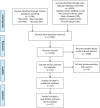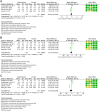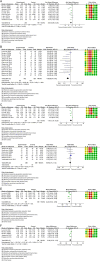Efficacy and safety of gut microbiota-based therapies in autoimmune and rheumatic diseases: a systematic review and meta-analysis of 80 randomized controlled trials
- PMID: 38475833
- PMCID: PMC10935932
- DOI: 10.1186/s12916-024-03303-4
Efficacy and safety of gut microbiota-based therapies in autoimmune and rheumatic diseases: a systematic review and meta-analysis of 80 randomized controlled trials
Abstract
Background: Previous randomized controlled trials (RCTs) suggested that gut microbiota-based therapies may be effective in treating autoimmune diseases, but a systematic summary is lacking.
Methods: Pubmed, EMbase, Sinomed, and other databases were searched for RCTs related to the treatment of autoimmune diseases with probiotics from inception to June 2022. RevMan 5.4 software was used for meta-analysis after 2 investigators independently screened literature, extracted data, and assessed the risk of bias of included studies.
Results: A total of 80 RCTs and 14 types of autoimmune disease [celiac sprue, SLE, and lupus nephritis (LN), RA, juvenile idiopathic arthritis (JIA), spondyloarthritis, psoriasis, fibromyalgia syndrome, MS, systemic sclerosis, type 1 diabetes mellitus (T1DM), oral lichen planus (OLP), Crohn's disease, ulcerative colitis] were included. The results showed that gut microbiota-based therapies may improve the symptoms and/or inflammatory factor of celiac sprue, SLE and LN, JIA, psoriasis, PSS, MS, systemic sclerosis, Crohn's disease, and ulcerative colitis. However, gut microbiota-based therapies may not improve the symptoms and/or inflammatory factor of spondyloarthritis and RA. Gut microbiota-based therapies may relieve the pain of fibromyalgia syndrome, but the effect on fibromyalgia impact questionnaire score is not significant. Gut microbiota-based therapies may improve HbA1c in T1DM, but its effect on total insulin requirement does not seem to be significant. These RCTs showed that probiotics did not increase the incidence of adverse events.
Conclusions: Gut microbiota-based therapies may improve several autoimmune diseases (celiac sprue, SLE and LN, JIA, psoriasis, fibromyalgia syndrome, PSS, MS, T1DM, Crohn's disease, and ulcerative colitis).
Keywords: Autoimmune disease; Gut microbiota-based therapies; Meta-analysis; Probiotics; Systematic review.
© 2024. The Author(s).
Conflict of interest statement
The authors declare that they have no competing interests.
Figures










Similar articles
-
Efficacy and safety of mesenchymal stromal cell transplantation in the treatment of autoimmune and rheumatic immune diseases: a systematic review and meta-analysis of randomized controlled trials.Stem Cell Res Ther. 2025 Feb 11;16(1):65. doi: 10.1186/s13287-025-04184-x. Stem Cell Res Ther. 2025. PMID: 39934871 Free PMC article.
-
Curcumin and Curcuma longa Extract in the Treatment of 10 Types of Autoimmune Diseases: A Systematic Review and Meta-Analysis of 31 Randomized Controlled Trials.Front Immunol. 2022 Aug 1;13:896476. doi: 10.3389/fimmu.2022.896476. eCollection 2022. Front Immunol. 2022. PMID: 35979355 Free PMC article.
-
Safety and efficacy of probiotic supplementation in 8 types of inflammatory arthritis: A systematic review and meta-analysis of 34 randomized controlled trials.Front Immunol. 2022 Sep 23;13:961325. doi: 10.3389/fimmu.2022.961325. eCollection 2022. Front Immunol. 2022. PMID: 36217542 Free PMC article.
-
Safety and efficacy of fecal microbiota transplantation for autoimmune diseases and autoinflammatory diseases: A systematic review and meta-analysis.Front Immunol. 2022 Sep 30;13:944387. doi: 10.3389/fimmu.2022.944387. eCollection 2022. Front Immunol. 2022. PMID: 36248877 Free PMC article.
-
Assessing the efficacy and safety of fecal microbiota transplantation and probiotic VSL#3 for active ulcerative colitis: A systematic review and meta-analysis.PLoS One. 2020 Mar 17;15(3):e0228846. doi: 10.1371/journal.pone.0228846. eCollection 2020. PLoS One. 2020. PMID: 32182248 Free PMC article.
Cited by
-
Advancing microbiota therapeutics: the role of synthetic biology in engineering microbial communities for precision medicine.Front Bioeng Biotechnol. 2024 Dec 4;12:1511149. doi: 10.3389/fbioe.2024.1511149. eCollection 2024. Front Bioeng Biotechnol. 2024. PMID: 39698189 Free PMC article. Review.
-
Intestinal and esophageal microbiota in esophageal cancer development and treatment.Gut Microbes. 2025 Dec;17(1):2505118. doi: 10.1080/19490976.2025.2505118. Epub 2025 May 16. Gut Microbes. 2025. PMID: 40376843 Free PMC article. Review.
-
The aging choroid plexus and its relationship with gut dysbiosis and Klotho decline: possible intervention strategies.Geroscience. 2025 Jul 22. doi: 10.1007/s11357-025-01797-1. Online ahead of print. Geroscience. 2025. PMID: 40691670 Review.
-
Effect of high-intensity laser therapy and photobiomodulation therapy on oral lichen planus-a systematic review and meta-analysis.Lasers Med Sci. 2025 Mar 20;40(1):151. doi: 10.1007/s10103-025-04398-8. Lasers Med Sci. 2025. PMID: 40108006 Free PMC article.
-
Higher Prevalence of the Periodontal Pathogen Selenomonas noxia among Pediatric and Adult Patients May Be Associated with Overweight and Obesity.Pathogens. 2024 Apr 19;13(4):338. doi: 10.3390/pathogens13040338. Pathogens. 2024. PMID: 38668293 Free PMC article.
References
Publication types
MeSH terms
LinkOut - more resources
Full Text Sources
Medical

